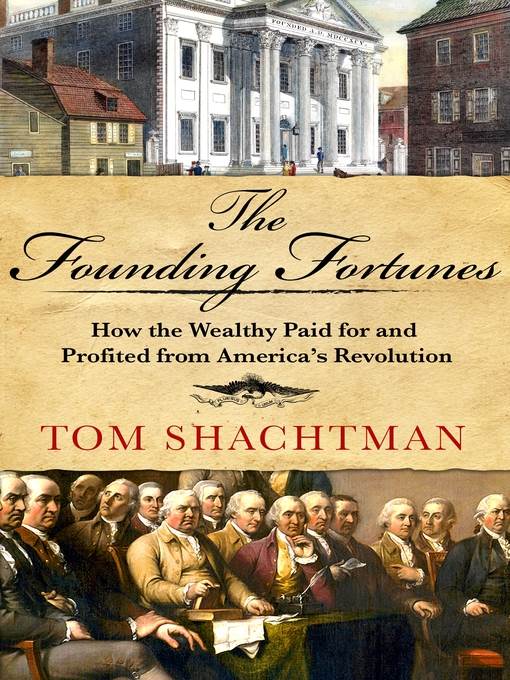
The Founding Fortunes
How the Wealthy Paid for and Profited from America's Revolution
کتاب های مرتبط
- اطلاعات
- نقد و بررسی
- دیدگاه کاربران
نقد و بررسی

October 11, 2019
Schachtman (How the French Saved America) examines economics from the end of the French and Indian War (1754-63) to the War of 1812, when the Americans and British contested authority over the eastern portion of the United States. Economic policy questions about control over land and sea, taxation, and awarding of governmental contracts emerge as themes throughout. Shachtman uses both primary and secondary sources to deliver a macroassessment of American economics during this period, with a focus on the merchants and political leaders of the time. What's lacking is a picture of the lower social classes who played a vital role in the country's formation. VERDICT Overall, the work presents a commendable treatment of pecuniary matters during this country's embryonic stages and is recommended for readers interested in fiscal matters and American economic habits.--Jacob Sherman, John Peace Lib., Univ. of Texas at San Antonio
Copyright 2019 Library Journal, LLC Used with permission.

October 15, 2019
An ingenious examination of how money played the central role in the founding of the United States. As prolific historian Shachtman (How the French Saved America: Soldiers, Sailors, Diplomats, Louis XVI, and the Success of a Revolution, 2017, etc.) points out, fighting Britain was extremely expensive. Lacking the power to tax, the Continental Congress performed terribly in their efforts to supply the army, but this obscures the fact that it spent a great deal of money and many men got rich. Partly, this was inherent in the primitive administration of 18th-century governments. Paid no salary, officials took a commission from money that passed through their hands, a practice that encouraged corruption. It was also not illegal to mix public and private business, so officials purchased from themselves or their friends. Due to slow communication and scanty legal protection, merchants and buyers relied on promises, personal guarantees, risky loans, and favors. Genuinely patriotic merchants like Robert Morris, as well as less admirable figures, took terrible risks and often suffered for it. Morris died poor. The feeble confederation that followed independence exasperated those concerned with foreign affairs, trade, raising capital, and collecting debts but not the average American. Shachtman emphasizes that no mass movement demanded change. The Constitution was championed "by a very small subset of the country's wealthy. If we add to the fifty-five men who attended the Constitutional Convention, twice or three times that number of nondelegates who later took the lead in urging ratification...the total is at best a few hundred men." They looked after their own interests, and their priorities were social order, contracts, collecting debts, and a strong currency. However, as the author shows, unlike the ultrawealthy today, most embraced equality of opportunity. Shachtman carries his account past the presidency of Thomas Jefferson, who opposed powerful governments, banks, and (in theory) great wealth. Despite this, the author maintains that his elimination of taxes and regulations increased equality of opportunity without inconveniencing the rich, and America prospered. A provocative argument that wealthy men built America and did a good job.
COPYRIGHT(2019) Kirkus Reviews, ALL RIGHTS RESERVED.

November 18, 2019
Historian Shachtman (How the French Saved America) offers a comprehensive survey of the economic factors that led to the Revolutionary War and explores how wealthy merchants, plantation owners, and privateers supported and benefited from the conflict in this workmanlike account. Among the ranks of affluent colonists whose resistance to British rule went against their own interests, Shachtman lists John Dickinson, a lawyer and Pennsylvania land owner who called on patriots to protest the 1767 Townshend Acts by refusing to import household staples including sugar and mustard, as well as luxury items such as silk garments and jewelry. Nonimportation of British goods also boosted American manufacturing and led to “a modest redistribution of wealth,” according to a historian quoted by Shachtman. Debunking the myth of the Continental Army soldier as a yeoman farmer, Shachtman shows that most were young, poor, and propertyless. (George Washington recruited his Virginia regiment by promising enrollees 100 acres of land at the end of their service.) To equip and feed the army, prosperous merchants such as Thomas Mifflin, Washington’s quartermaster general, extended their personal credit to purchase supplies. Shachtman marshals his evidence efficiently and enlivens his account with bold, direct statements (“the Constitution was as much about capitalism as democracy”). Colonial history buffs will savor this sharply focused study.

December 1, 2019
The monetization of the American Revolution by the rich, and its linkage with the new constitutional government, forms the crux of this book by prolific historian Shachtman (Gentlemen Scientists and Revolutionaries, 2014). Here he analyzes the makeup of the Constitutional Convention, dissects the taxation power of the states and federal government, and emphasizes that the compromises involved (over taxation, direct election, slavery) favored the privileged and wealthy. The fight over ratification and, later, the party system intensified these conflicts and, though in some ways pro-democratic, had a similar skew. These are not unique insights, but they are well documented, and explained clearly. As the party system developed, Alexander Hamilton and the Federalists further promoted the interests of the rich in the establishment and operation of the First Bank of the United States. In modern terms (which Shachtman utilizes), they favored trickle-down economics. Opposed to them were President Thomas Jefferson, his financial expert, Albert Gallatin, and, somewhat later, President James Madison, who steered the U.S. into the War of 1812 for primarily economic reasons. Enlightening history with contemporary parallels.(Reprinted with permission of Booklist, copyright 2019, American Library Association.)

























دیدگاه کاربران